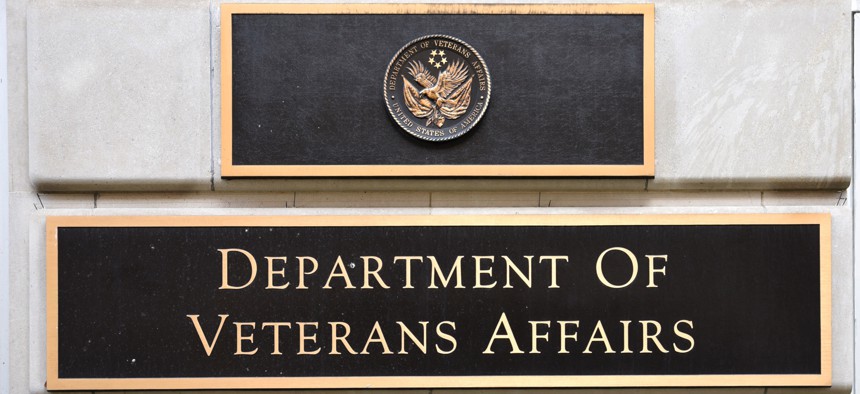
House members repeatedly questioned VA officials Thursday about their handling of potential conflicts of interest with contractors. Robert Alexander / Getty Images
VA’s work with outside vendors draws lawmaker scrutiny over conflicts of interest
Rep. Jen Kiggans, R-Va., said VA’s claim it “had no occasions” where it identified an actual or potential conflict of interest with its contractors was “not believable.”
Members of the House Veterans’ Affairs Committee pressed officials from the Veterans Affairs Department on Thursday about their oversight of consultants and contractors, expressing concern that VA is not doing enough to identify or prevent potential conflicts of interest when working with third-party vendors.
The joint House Oversight and Investigations and Technology Modernization subcommittee hearing focused, in large part, on what lawmakers deemed to be ineffective governance of the billions of contracting dollars VA has spent in recent years, with the department’s perceived lack of rigorous vetting receiving particular attention from the chairs of both subcommittees.
Rep. Jen Kiggans, R-Va. — the chair of the House Veterans’ Affairs Oversight and Investigations Subcommittee — said VA “seems to have become complacent with its contractors’ potential conflicts of interests,” particularly since the department “doled out over $38 billion to contractors” in 2021.
Kiggans noted that she sent a March 28 letter to VA Secretary Denis McDonough asking “how many times a VA contracting officer identified, mitigated or otherwise resolved a contractor's potential or actual conflict of interest in the last two fiscal years.”
Kiggans’ letter came after The Wall Street Journal published an article earlier that month describing how the McKinsey consulting firm was working with VA on a range of projects — including advising the department on its internal management — while simultaneously advising Purdue Pharma and other pharmaceutical companies about how to target VA and increase their clients’ opioid sales.
Kiggans said that McDonough wrote in his May 31 response that the department “had no occasions” where it identified a potential or actual conflict — a claim that she called “not believable.”
“Given everything we know about the size of the VA spending and what functions have been outsourced, this was implausible,” she said, adding that McDonough’s response “made it clear that the VA had no concern whatsoever about McKinsey's web of clients impacting its work for the department.”
VA Chief Acquisition Officer Michael Parrish defended the department’s contracting process, however, saying that he stood by McDonough’s response “to the best of my knowledge.”
Parrish noted that VA adheres to the Federal Acquisition Regulation and that “contractors are selected based upon their competency and ability to successfully respond to the solicitation requirements.
“Many companies have multiple areas of expertise and compete on requirements for different services throughout the enterprise,” he added. “VA takes the concern of organizational conflict of interest very seriously — as do I personally — and we ensure its contract awards comply with the FAR, the VA acquisition regulation, as well as the VA acquisition manual.”
Over the past 12 months, Parrish said that VA received three major organizational conflict of interest — or OCI — complaints from industry, and that independent investigations conducted by the Government Accountability Office determined “that those OCI’s did not exist, and that VA did indeed follow the proper procedures and the determination process.”
Parrish added that another “current high-visibility OCI allegation” is under investigation, although he did not provide details about the complaint.
When asked, however, about concerns regarding a theoretical company holding contracts in competing areas or for multiple projects across VA, Parrish said “I believe there's potential for perception of conflict.” But he underscored that the department is “focused on over-communicating and having large transparency and jointness with our vendors and our industry partners.
“One of the requirements we do with these big programs is, once we think we're ready, instead of just throwing it over the fence to industry, we make sure industry has input and by shining sunlight on that so every vendor has the opportunity to see it,” Parrish added. “So there's not one vendor that gets an unfavorable advantage.”
Lawmakers also used Thursday‘s hearing to reiterate concerns about the department’s tendency to work with the same cadre of large companies, noting that this type of relationship often sidelines smaller firms that could diversify VA’s network of vendors.
The hearing came after the Technology Modernization Subcommittee held a May 24 hearing focused on VA’s information technology contracts, during which lawmakers highlighted that the department awarded more than half of its IT-related contracts in 2021 to just 10 outside vendors.
Rep. Matt Rosendale, R-Mont. — who chairs the Technology Modernization Subcommittee — said the department “spends over $3 billion a year on management consulting contracts,” with the top 10 consulting firms receiving “about 40% of VA’s consulting dollars.
“When contractors are virtually indistinguishable from government employees and they are privy to most information that passes through the agency, there is a lot of opportunity to exploit access to non-public information,” Rosendale added.
But Parrish said the same large companies and firms receiving contracts was a governmentwide problem, adding that he was concerned federal regulations have “created an unintentional bias against small businesses to be able to bid on some of our contracts, especially in the IT space.
“We have to find a way governmentwide to improve some of these regulatory requirements to help small businesses,” he said, noting that it can take years and significant expenditures for firms to receive FedRAMP certification.







